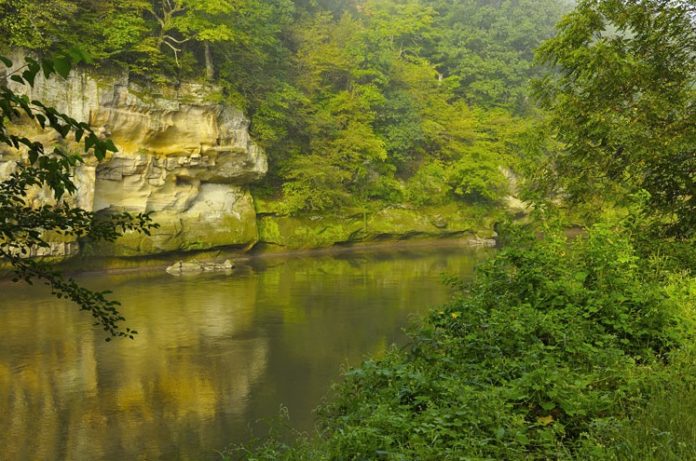
Three of the leading names in Iowa’s fractious water quality debate — the Des Moines Water Works’ Bill Stowe, the Iowa Soybean Association’s Roger Wolf and IOWATER’s Mary Skopec — will hold a public conversation Saturday, Aug. 20 at 10:30 a.m. in the shelter house of the Hanging Rock Conservation Area, 916 Redfield St. in Redfield.
The event, sponsored by the Dallas County Conservation Department, is free and open to the public. The 90-minute conversation will be followed in the afternoon by a four-hour float down the Middle Raccoon River for anyone wishing to see at first hand what the conversation is about.

“Rarely does a day go by that Iowa’s water quality issues do not fill the headlines of our local newspapers and TV news shows,” said Chris Adkins, environmental education coordinator with the Dallas County Conservation Department.
“Do you as a citizen of your watershed understand the issues?” Adkins asked. “What are the major pollutants of our water ways? What are their sources? What are the impacts of these pollutants? How can the quality of the waters of the Raccoon Rivers be improved?”
Adkins has lined up some water-quality superstars to explore the answers to these questions.

Stowe is the CEO and general manager of the Des Moines Water Works. He caused an uproar among Iowa commodity producers and some state lawmakers in 2015 when the Des Moines Water Works sued three northwest Iowa counties for polluting the Raccoon River in violation of the U.S. Environmental Protection Agency Clean Water Act.
Stowe wrote an editorial in January that outlined a five-point plan for improving the state’s surface water quality. He called for the mandatory regulation of water pollution from farms and drainage districts and proposed tying public subsidies for agriculture, such as crop insurance, to farms’ water-quality practices.
He also recommended implementing a statewide watershed plan and called for a moratorium on new concentrated animal feeding operations (CAFOs).
“At what point can communities reach the conclusion that our state refuses to reach in saying ‘No’ to more confinements and their adverse impacts on our communities’ and states’ water and air quality?” Stowe wrote.

Wolf is the director of environmental programs and services for the Iowa Soybean Association (ISA) and executive director of the Agriculture’s Clean Water Alliance, which represents a dozen commodity groups.
The ISA has operated an extensive network of water-quality monitors for more than 10 years, including 105 sites in the Des Moines River and Raccoon River watersheds, and Wolf has sometimes been criticized by farm groups for releasing data on nitrate concentration.
At the same time, the ISA board of directors voted in July to contribute $150,000 toward the legal defense of Buena Vista, Calhoun and Sac counties, defendants in the Des Moines Water Works suit.
“As I think about the future,” Wolf recently told an interviewer, “conservation and environmental quality are key principles for business resilience. We need to take the principles of a legacy that has been built and realizing the next generation of opportunities.”

Skopec is a research geologist and since 2000 has been the IOWATER program coordinator for the Iowa Department of Natural Resources (DNR).
IOWATER is a volunteer water-monitoring program aiming to protect and improve Iowa’s water quality by raising citizen awareness about Iowa’s watersheds. The volunteer group supports and encourages the growth and networking of Iowa’s water-monitoring communities and promotes water-monitoring activities as a means of assessing Iowa’s aquatic resources.
Skopec also coordinates the DNR’s beach monitoring program and is sometimes compelled to close beaches and issue warnings about algae blooms.
“We don’t want to scare people,” Skopec said last September, when a portion of Saylorville was closed due to a toxic blue-green algae bloom. “This is a naturally occurring event. It happens every year in our lakes and rivers. We just want people to be aware that if the mycrocystins are present, it can cause problems for people or pets.”

Other figures on the Iowa water-quality scene might make an appearance at Saturday’s conversation, such as Mike Delaney, one of the founders of the Raccoon River watershed Association.
“The January-to-July average nitrate concentration in the Des Moines River was the highest on record at over 11 milligrams per liter,” Delaney said recently. “Don’t tell me the Nutrient Reduction Strategy is working, but do tell me that Iowa is going to get serious about getting back on the downward nitrogen level trend that was occurring before the last spike in corn and bean prices.”

Another possible attendee is Francis Thicke, a Fairfield cattle farmer and 2010 candidate for Iowa Secretary of Agriculture. Thicke claims there is “one straightforward solution to Iowa’s water quality problems. Every Iowa farm should have a water quality plan that addresses the water quality concerns on each farm and brings the farm-level loss of nitrogen and phosphorus down to a level which in the aggregate will meet the goals of the Iowa Nutrient Reduction Strategy.”
Participants looking to extend their study of the Raccoon River can also join an afternoon float from 1-5 p.m., starting at the lowhead dam in Redfield and floating to the Pleasant Valley river access. A shuttle from the take-out point back to the put-in at Redfield will be availble for paddlers.
“The morning’s conversations will take on new life at the end of a paddle,” Adkins said. “In Dallas County, we are blessed to have three branches of the Raccoon River flowing across our landscapes.”
For more information or to register for the program, contact Adkins at the Dallas County Conservation Board, 515-465-3577 or conservation@dallascountyiowa.gov.
















